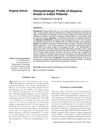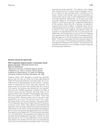Search
for
Sort by
Research
720-750 / 1000+ results
research Rare and Common Genetic Determinants of Metabolic Individuality and Their Effects on Human Health
Genetic variations greatly affect individual metabolism and can impact health and disease risk.
research Intercellular Adhesion Molecule-1 and Hair Follicle Regression
ICAM-1 helps regulate hair growth cycles and skin remodeling.
research Direct Cellular Reprogramming Enables Development of Viral T Antigen-Driven Merkel Cell Carcinoma in Mice
Scientists made a mouse model of a serious skin cancer by changing skin cells with a virus and a specific gene, which is similar to the disease in humans.
research Homozygous Nonsense Mutation in DSC3 Resulting in Skin Fragility and Hypotrichosis
A boy's skin fragility and sparse hair were caused by a genetic mutation affecting skin cell adhesion.
research Tissue and Circulating MicroRNA Co-expression Analysis Shows Potential Involvement of miRNAs in the Pathobiology of Frontal Fibrosing Alopecia
Certain microRNAs might help identify and understand Frontal Fibrosing Alopecia.
research Impact of mTORC1 Inhibition on Keratinocyte Proliferation During Skin Tumor Promotion in Wild-Type and BK5.AktWT Mice
Rapamycin reduces skin cell growth and tumor development by affecting cell signaling in mice.

research Interstitial Pneumonia with Autoimmune Features: Challenges and Controversies
The document concludes that diagnosing and treating Interstitial Pneumonia with Autoimmune Features (IPAF) is challenging, needs a multidisciplinary approach, and further research for better diagnostic criteria and treatments. It also emphasizes regular checks for Connective Tissue Disease symptoms in all patients with Interstitial Lung Disease.

research Dietary Vitamin A Impacts Refractory Telogen
Eating too much or too little vitamin A can cause hair loss.

research The Optimal Holding Solution and Temperature for Hair Follicle Grafts
Best solution for storing hair grafts is saline with ATP at 4 degrees Celsius, but no definitive best method was confirmed.
research Retinoids in Dermatology
Retinoids are effective for severe acne and psoriasis but can cause serious side effects and birth defects.
research Dermal Lymphatic Dilation in a Mouse Model of Alopecia Areata
Mice with alopecia areata had wider lymphatic vessels in their skin.

research Neutrophil Extracellular Traps Impair Regeneration
White blood cells and their traps can slow down the process of new hair growth after a wound.

research Surgical Hairline Advancement: Patient Candidacy and Best Techniques
SHA lowers the hairline quickly and patients are usually happy with the results if they are good candidates.
research Appraisal of Paclitaxel Pros and Cons in Cancer Management and Drug Repurposing Prospects
Paclitaxel is an effective cancer drug with side effects and potential new uses beyond cancer.
research Keratin Promotes Differentiation of Keratinocytes Seeded on Collagen/Keratin Hydrogels
Keratin helps skin cells mature when added to a collagen mix, which could be important for skin and hair health.

research Current Protocols: Alopecia Areata Mouse Models for Drug Efficacy and Mechanism Studies
The C3H/HeJ mouse model is useful for studying and testing treatments for alopecia areata.

research Antiviral Drugs Prolong Survival in Murine Recessive Dystrophic Epidermolysis Bullosa
Antiviral drugs, especially daclatasvir, may be a new treatment for a rare skin disease, improving survival and reducing symptoms in mice.

research 4-Aminopyridine Induces Nerve Growth Factor to Improve Skin Wound Healing and Tissue Regeneration
4-Aminopyridine improves skin wound healing and tissue regeneration by increasing cell growth and promoting nerve repair.

research Permeation of Topically Applied Magnesium Ions Through Human Skin Is Facilitated by Hair Follicles
Hair follicles help magnesium get through the skin more effectively.

research A Case of Red Lunulae After Hematopoietic Stem Cell Transplantation
Adjusting the medication tacrolimus resolved a boy's red nail beds after a stem cell transplant.

research Histopathologic Profile of Alopecia Areata in Indian Patients
The study found that the cause of alopecia areata can be identified through tissue analysis, and vertical sections are enough for diagnosis.

research Prominent Follicular Mucinosis With Diffuse Scalp Alopecia Resembling Alopecia Areata
A woman's hair loss, resembling an autoimmune condition, improved after treatment, but requires ongoing checks due to potential serious associations.

research The Effectiveness of Treatments for Androgenetic Alopecia: A Systematic Review and Meta-Analysis
Minoxidil, finasteride, and low-level laser light therapy effectively treat hair loss.

research Development of Liposomal Systems of Finasteride for Topical Applications: Design, Characterization, and In Vitro Evaluation
Liposomes improve finasteride delivery for hair loss treatment, making it a promising option for topical use.

research Congenital Alopecia Areata: A Systematic Review
Congenital alopecia areata may have genetic links and topical corticosteroids are an effective treatment.

research Hair Physiology and Its Disorders
Different hair growth problems are caused by genetic issues or changes in hair growth cycles, and new treatments are being developed.

research Regulatory T Cells in Skin: Role of Foxp3+ CD4+ Tregs in Skin Homeostasis and Immune Tolerance
Skin's Regulatory T cells are crucial for maintaining skin health and could be targeted to treat immune-related skin diseases and cancer.

research Topical Minoxidil in the Treatment of Alopecia Areata
Minoxidil helps hair regrowth in alopecia patients, with 16 having good results and no side effects.

research Clinical Symptoms of Hyperandrogenic Women Diagnosed with COVID-19
Women with high androgen levels may have more severe COVID-19 symptoms.